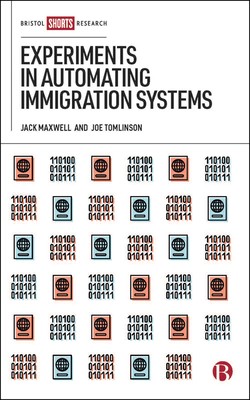
- We will send in 10–14 business days.
- Author: Jack Maxwell
- Publisher: Policy Press
- ISBN-10: 1529219841
- ISBN-13: 9781529219845
- Format: 12.7 x 20.3 x 1 cm, hardcover
- Language: English
- SAVE -10% with code: EXTRA
Reviews
Description
In recent years, the United Kingdom's Home Office has started using automated systems to make immigration decisions. These systems promise faster, more accurate, and cheaper decision-making, but in practice they have exposed people to distress, disruption, and even deportation.
This book identifies a pattern of risky experimentation with automated systems in the Home Office. It analyses three recent case studies including: a voice recognition system used to detect fraud in English-language testing; an algorithm for identifying 'risky' visa applications; and automated decision-making in the EU Settlement Scheme.
The book argues that a precautionary approach is essential to ensure that society benefits from government automation without exposing individuals to unacceptable risks.
EXTRA 10 % discount with code: EXTRA
The promotion ends in 20d.17:53:08
The discount code is valid when purchasing from 10 €. Discounts do not stack.
- Author: Jack Maxwell
- Publisher: Policy Press
- ISBN-10: 1529219841
- ISBN-13: 9781529219845
- Format: 12.7 x 20.3 x 1 cm, hardcover
- Language: English English
In recent years, the United Kingdom's Home Office has started using automated systems to make immigration decisions. These systems promise faster, more accurate, and cheaper decision-making, but in practice they have exposed people to distress, disruption, and even deportation.
This book identifies a pattern of risky experimentation with automated systems in the Home Office. It analyses three recent case studies including: a voice recognition system used to detect fraud in English-language testing; an algorithm for identifying 'risky' visa applications; and automated decision-making in the EU Settlement Scheme.
The book argues that a precautionary approach is essential to ensure that society benefits from government automation without exposing individuals to unacceptable risks.


Reviews